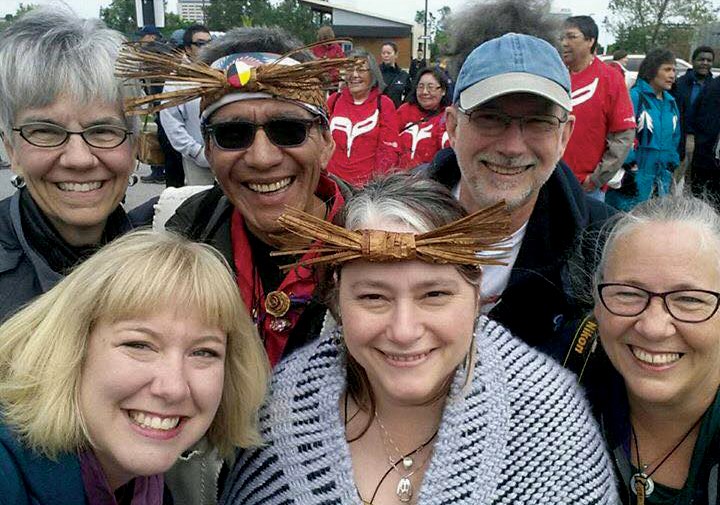The release of the Truth and Reconciliation Committee (TRC) final report this week and the certification of the shíshálh Nation’s day scholar lawsuit ahead of schedule are likely connected, according to shíshálh Nation Chief Calvin Craigan.
Originally the judge involved wasn’t supposed to deliver a verdict on certification of the class action lawsuit until the end of the year, but the chief suspects the release of the TRC report influenced the timing and he hopes it will have an impact on the case.
“We think the case will go forward sooner than we anticipated, and we anticipate that rather than bringing it to court, because of what’s transpired at the TRC, we’re hoping and thinking the government will come forward with an offer of settlement,” Craigan said.
One of the recommendations in the TRC report this week called on the federal government to “work collaboratively with plaintiffs not included in the Indian Residential Schools Settlement Agreement to have disputed legal issues determined expeditiously on an agreed set of facts.”
Craigan said that recommendation was aimed at the day scholars.
Many members of the shíshálh Nation were left out of the Indian Residential Schools Settlement because they didn’t live at residential schools, but rather were allowed to go home at night.
The shíshálh Nation has been arguing for years that its day scholars were just as abused and scarred from the residential schools as those who were forced to live there full-time.
The shíshálh Nation and the Tk’emlups Nation from Kamloops together launched a class action lawsuit against the government in 2012 in an effort to have day scholars offered an apology and settlement from the government.
On Wednesday, June 3, Craigan said a judge certified the class action lawsuit, allowing the case to move forward. The shíshálh Nation has set up a website for any day scholar wishing to join at www.justicefordayscholars.com
Settling the day scholars issue is an important step toward reconciliation for the shíshálh Nation, as is sharing the true history of the First Nations people, which was highlighted as an item for action in the TRC report.
“The number of people who died in the First World War, the numbers compare in terms of how many people we lost in residential school,” Craigan said.
“When the real story comes out, it’s going to be horrific. I mean, there are gravesites of babies and young children. It goes on and on. It’s horrifying.”
The need to have the real history exposed led to several recommendations around education by the TRC.
One of those recommendations calls for the need to make age-appropriate curriculum on residential schools, treaties and Aboriginal people’s historical and contemporary contributions to Canada a mandatory education requirement for all grades.
Some of the TRC recommendations to government include providing sustainable funding for Aboriginal healing centres, adopting the United Nations Declaration on the Rights of Indigenous Peoples as the framework for reconciliation, establishing a national council for reconciliation and committing $10 million over 10 years to a national centre for truth and reconciliation.
Craigan expects the federal government will take its time to implement the recommendations it could move forward with.
“I think they will try to delay it as long as they can until after the election,” he said.
Not all of the 94 recommendations are aimed at government, however. Some call for action by churches, schools and societies to reconcile with First Nations people.

One local First Nations man, Terry Aleck of the Lytton Nation, who was part of the original class action lawsuit that resulted in the formation of the TRC, travelled to Ottawa to witness the release of the final TRC report. He said he sees the Sunshine Coast as miles ahead of other communities in terms of meeting many of the TRC recommendations.
“The Sunshine Coast is an awesome place to live, and I know we are way ahead of a lot of the communities because of quite a few of us sharing in and out of the schools,” said Aleck, who works with Kerry Mahlman, the local principal of Aboriginal programs, to help bring First Nations culture into the school setting.
“With all the recommendations that came forward, all 94 of them, I thought ‘OK, we’re doing quite a few of them actually’,” Aleck said. “So it’s just a matter of really convincing the government from the top down that they have a lot of work to do, that they have to keep up with us now and really be patient and committed to this reconciliation.”
The TRC was created in 2009 as part of the terms of settlement from a class action lawsuit against the federal government and four national churches launched by former residential school students.
Its mandate included providing a place for anyone affected by the residential schools to share their individual experiences and creating an accurate historical record of those experiences. It was also tasked with preparing a public report complete with recommendations to advance reconciliation in Canada.
Find the full report and list of recommendations at www.trc.ca



